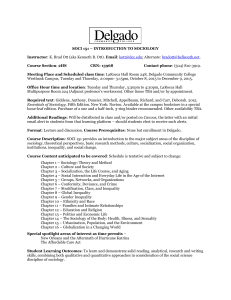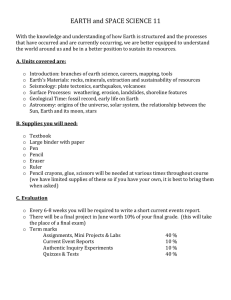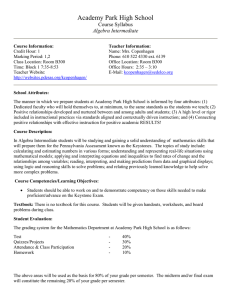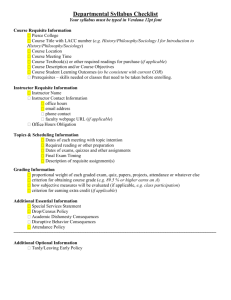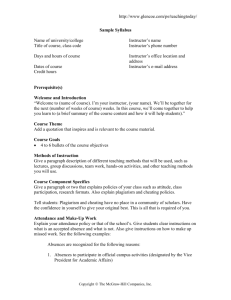Introduction to Sociology Syllabus Winter 2015
advertisement
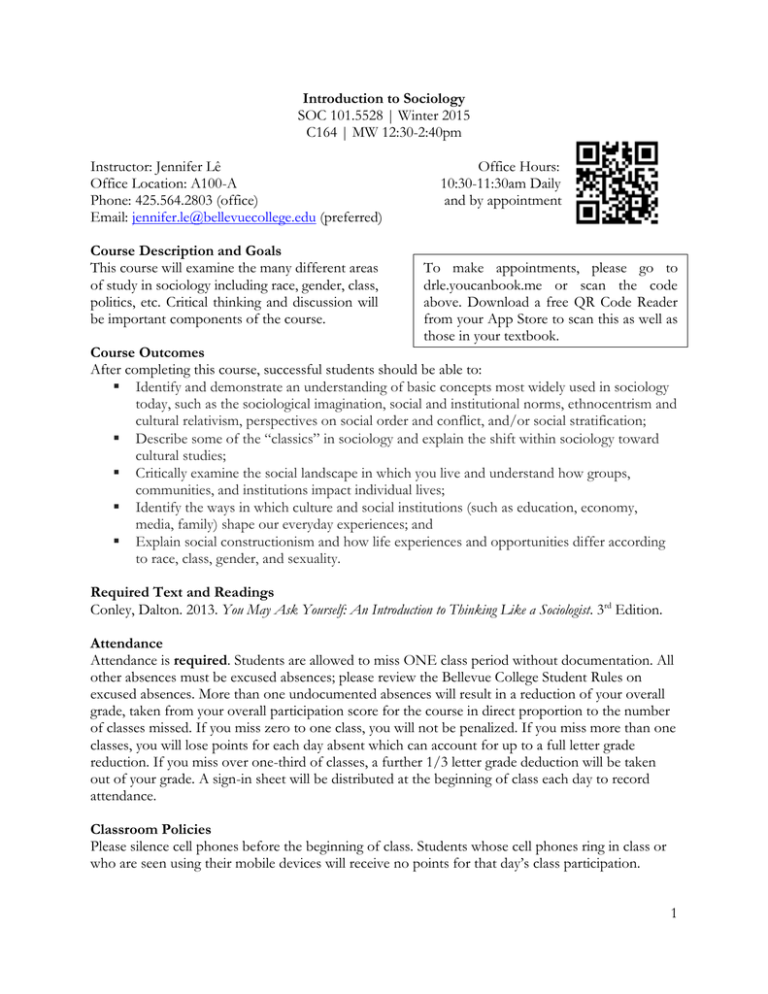
Introduction to Sociology SOC 101.5528 | Winter 2015 C164 | MW 12:30-2:40pm Instructor: Jennifer Lê Office Location: A100-A Phone: 425.564.2803 (office) Email: jennifer.le@bellevuecollege.edu (preferred) Course Description and Goals This course will examine the many different areas of study in sociology including race, gender, class, politics, etc. Critical thinking and discussion will be important components of the course. Office Hours: 10:30-11:30am Daily and by appointment To make appointments, please go to drle.youcanbook.me or scan the code above. Download a free QR Code Reader from your App Store to scan this as well as those in your textbook. Course Outcomes After completing this course, successful students should be able to: Identify and demonstrate an understanding of basic concepts most widely used in sociology today, such as the sociological imagination, social and institutional norms, ethnocentrism and cultural relativism, perspectives on social order and conflict, and/or social stratification; Describe some of the “classics” in sociology and explain the shift within sociology toward cultural studies; Critically examine the social landscape in which you live and understand how groups, communities, and institutions impact individual lives; Identify the ways in which culture and social institutions (such as education, economy, media, family) shape our everyday experiences; and Explain social constructionism and how life experiences and opportunities differ according to race, class, gender, and sexuality. Required Text and Readings Conley, Dalton. 2013. You May Ask Yourself: An Introduction to Thinking Like a Sociologist. 3rd Edition. Attendance Attendance is required. Students are allowed to miss ONE class period without documentation. All other absences must be excused absences; please review the Bellevue College Student Rules on excused absences. More than one undocumented absences will result in a reduction of your overall grade, taken from your overall participation score for the course in direct proportion to the number of classes missed. If you miss zero to one class, you will not be penalized. If you miss more than one classes, you will lose points for each day absent which can account for up to a full letter grade reduction. If you miss over one-third of classes, a further 1/3 letter grade deduction will be taken out of your grade. A sign-in sheet will be distributed at the beginning of class each day to record attendance. Classroom Policies Please silence cell phones before the beginning of class. Students whose cell phones ring in class or who are seen using their mobile devices will receive no points for that day’s class participation. 1 Students are permitted to use computers to take notes if they wish. However, note taking is the only activity allowed during class. If any students engage in other activities on their computers during class meetings they will receive a zero for that day’s class participation after one warning. Course Requirements Online Quizzes (100 points total, 20 points each) Weekly quizzes will take place on the last day of a week five times in the quarter and cover the material from that week. They will be multiple choice in format and only available online. No makeup or late quizzes will be accepted. You will have a full 24-hour period to take the quiz but it will be timed. Exams (300 points total, 100 points each) There will be three exams in this course. Each exam is worth 100 points. The exams will be composed of multiple choice questions and potential short essay questions. However, there will be no scantron or bluebook needed. Sociological Imagination Papers (430 points total) Throughout the quarter, you will be writing three short (2-3 pages) and one long paper (5-7 pages) relating sociology to your life. The larger paper (5-7 pages) will be made up of sections of the three papers before it along with additional content. Assignment guidelines will be available on Canvas. Paper 1 – Family (90 points) Paper 2 – Education (90 points) Paper 3 – Social Forces (100 points) Paper 4 – Sociological Portrait (150 points) Each paper should follow proper citation guidelines using wither MLA or APA style. This website contains helpful guidelines: https://owl.english.purdue.edu/owl/. The format for all papers should be double spaced, Times New Roman 12 point font, with 1 inch margins on all sides, and no title page or running header. Guidelines and a grading rubric will be available for students to review. Papers are to be uploaded on Canvas before the due date. Vine Project (50 points total) The final project for this class will involve creating a Vine (a 6 second video) about what sociology means to you OR to demonstrate your favorite concept(s) from class. You will need to download the free Vine app from your App Store or borrow a classmate’s mobile device during our designated workday. Creativity and originality are very welcome. Students are required to make an original Vine, write a paper, and make a presentation. Assignment guidelines will be available on Canvas. Reading and Film Worksheet (40 points total, 20 points each) A worksheet will be provided to you twice during the quarter. Follow the directions for the worksheet and submit by the due date. 2 Attendance and Participation (100 points total, 50 for attendance, 50 for participation/pop quizzes) Attendance is required. A sign in sheet will go around each class period. You may miss up to 1 class without penalty. You will be penalized if you have 2 or more unexcused absences (see BC policy regarding excused vs unexcused absences). This penalty includes an overall reduction in grade relative to the number of unexcused absences and an additional 1/3 letter grade reduction if absences total one-third or more of the class sessions. Participation includes pop quizzes, answering questions when called upon, participating in discussions, and asking insightful and engaging questions related to course material. Pop quizzes will occur randomly throughout the term based on the material you are expected to have read for that class day. These quizzes will amount to one-quarter of your participation grade or 5% of the overall grade. Grade Distribution TOTAL: 1000 points A = 930 - 1000+ A- = 900 - 929 B+ = 870 - 899 B = 830 - 869 B- = 800 - 829 C+ = 770 - 799 C = 730 - 769 C- = 700 - 729 D+ = 670 - 699 D = 630 - 669 D- = 600 - 629 F = 0 – 599 1st Exam – 100 points = 10% 2nd Exam – 100 points = 10% 3rd Exam – 100 points = 10% Vine Project – 50 points = 5% Quizzes – 100 points (20 points each) = 10% Paper 1 – 90 points = 9% Paper 2 – 90 points = 9% Paper 3 – 100 points = 10% Paper 4 – 150 points = 15% Reading Worksheet – 20 points = 2% Film Worksheet – 20 points = 2% Attendance/Participation – 100 points = 10% Note: There will be no curve in this class, including for single assignments. Your grade is what you earn. To excel in this course, a student should stay on top of course readings. All students are expected to have read the assigned material before each class meeting. Attendance is always helpful (and required) to get a better understanding of the material. If you have any questions at all, please utilize my office hours. I want you to do your very best in this course, and I will help all students as much as I can. Extra Credit There may be opportunities for extra credit throughout the quarter. These opportunities are generally events on campus which involve a lecture, documentary showing, debate, or a cultural event with an educational component. The requirements for the reflection paper are on Canvas. The papers will be due by 11:59pm one week after the event. Additionally, video links will be posted in the Canvas assignment link. These videos may be watched and analyzed similar to the events. Video link extra credit papers will be due by 11:59pm on the last regular course day. Students may complete TWO of these extra credit opportunities (one event or one video) for a possible 15 points each or 30 points total. These extra points are added onto a student’s total points for the course. No late work will be accepted without a pre-approved reason. 3 Late Policy All missed assignments and exams must be pre-approved by the instructor PRIOR to the due date. Make-up exams will be given at the discretion of the instructor and must occur before the due date. Any missed assignments or exams not pre-approved by the instructor must accompany a BCapproved excuse in order for a make-up or extended due date to be given. Unapproved absences that result in missed assignments or zeros cannot be made up. Tentative Schedule M Intro to the class T M Culture and Media 75-113 T HOW TO READ THE SCHEDULE BELOW: Day of the Week Topic Reading Due Before Class Assignment Due Week One – January 5-9 W R F Basics of Sociology 3-39 Reading Quiz 1 DUE Worksheet DUE Week Two – January 12-16 W R Socialization F 117-149 Quiz 2 DUE M NO CLASS T Week Three – January 19-23 W R Groups and Networks 153-183 F Quiz 3 DUE M Family 451-491 T Week Four – January 26-30 W R Stratification 239-275 F Paper 1 DUE M Exam 1 No reading T Week Five – February 2-6 W R Education 495-533 Quiz 4 DUE F 4 M Gender 279-321 M NO CLASS T T Week Six – February 9-13 W R Race 325-371 Week Seven – February 16-20 W R Economy 537-569 F Paper 2 DUE F Quiz 5 DUE M Politics T 573-607 Week Eight – February 23-27 W R Deviance and Vine Work Day 187-233 F Paper 3 DUE M Exam 2 No reading T M Presentations No reading T M Presentations No reading T M NO CLASS T Week Nine – March 2-6 W R Film No reading Film Worksheet DUE Week Ten – March 9-13 W R Presentations No reading Week Eleven – March 16-20 W R Presentations No reading Last day to submit extra credit Week Twelve – March 23-27 – Final Exam Week W – 11:30a-1:20p R Final Exam F F F Paper 4 DUE F Disability Resource Center The Disability Resource Center serves students with a wide array of learning challenges and disabilities. If you are a student who has a disability or learning challenge for which you have 5 documentation or have seen someone for treatment and if you feel you may need accommodations in order to be successful in college, please contact us as soon as possible. The DRC office is located in B132 or you can call our reception desk at 425.564.2498. Deaf students can reach us by video phone at 425-440-2025 or by TTY at 425-564-4110. Please visit our website for application information into our program and other helpful links at www.bellevuecollege.edu/drc Affirmation of Inclusion Bellevue College is committed to maintaining an environment in which every member of the campus community feels welcome to participate in the life of the college, free from harassment and discrimination. We value our different backgrounds at Bellevue College, and students, faculty, staff members, and administrators are to treat one another with dignity and respect. http://bellevuecollege.edu/about/goals/inclusion.asp Academic Honesty and Integrity Cheating, stealing, and plagiarizing (using the ideas or words of another as one’s own without crediting the source) and inappropriate/disruptive classroom behavior are violations of the Student Code of Conduct at Bellevue College. Examples of unacceptable behavior include, but are not limited to, talking out of turn, arriving late or leaving early without a valid reason, allowing cell phones/pagers to ring, and inappropriate behavior toward the instructor or classmates. The instructor can refer any violation of the Student Code of Conduct to the Dean of Student Success for investigation. Specific student rights, responsibilities, and appeal procedures are listed in the Student Code of Conduct at http://bellevuecollege.edu/policies/2/2050_Student_Code .asp Copyright Notice All documents disseminated by your instructor are under copyright by said instructor. Any re-use or distribution of these materials outside of our classroom without permission is copyright infringement and is considered a crime. Final Comments It is my goal to make this course worth your time and effort. Therefore, I will do all that is reasonable and within my power to ensure that you learn and succeed. If you are concerned with any aspect of this course please feel free to contact me. 6
